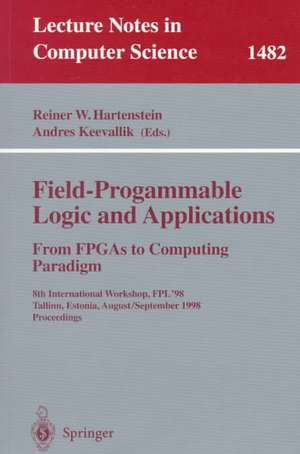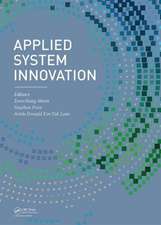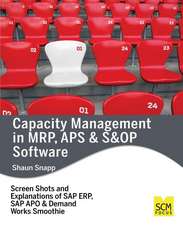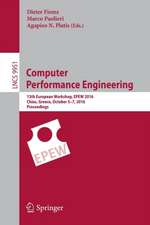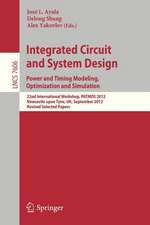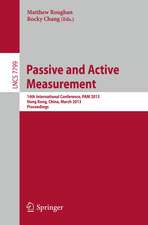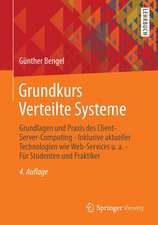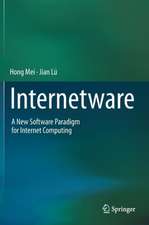Field-Programmable Logic and Applications. From FPGAs to Computing Paradigm: 8th International Workshop, FPL'98 Tallinn, Estonia, August 31 - September 3, 1998 Proceedings: Lecture Notes in Computer Science, cartea 1482
Editat de Reiner W. Hartenstein, Andres Keevalliken Limba Engleză Paperback – 14 aug 1998
The 39 revised full papers presented were carefully selected for inclusion in the book from a total of 86 submissions. Also included are 30 refereed high-quality posters. The papers are organized in topical sections on design methods, general aspects, prototyping and simulation, development methods, accelerators, system architectures, hardware/software codesign, system development, algorithms on FPGAs, and applications.
Din seria Lecture Notes in Computer Science
- 20%
 Preț: 1061.55 lei
Preț: 1061.55 lei - 20%
 Preț: 307.71 lei
Preț: 307.71 lei - 20%
 Preț: 438.69 lei
Preț: 438.69 lei - 20%
 Preț: 579.30 lei
Preț: 579.30 lei -
 Preț: 410.88 lei
Preț: 410.88 lei - 17%
 Preț: 427.22 lei
Preț: 427.22 lei - 20%
 Preț: 596.46 lei
Preț: 596.46 lei - 15%
 Preț: 448.04 lei
Preț: 448.04 lei - 20%
 Preț: 353.50 lei
Preț: 353.50 lei -
 Preț: 389.49 lei
Preț: 389.49 lei - 20%
 Preț: 309.90 lei
Preț: 309.90 lei - 20%
 Preț: 645.28 lei
Preț: 645.28 lei - 20%
 Preț: 763.23 lei
Preț: 763.23 lei - 15%
 Preț: 580.46 lei
Preț: 580.46 lei - 20%
 Preț: 310.28 lei
Preț: 310.28 lei - 20%
 Preț: 655.02 lei
Preț: 655.02 lei - 20%
 Preț: 1183.14 lei
Preț: 1183.14 lei - 20%
 Preț: 340.32 lei
Preț: 340.32 lei -
 Preț: 449.57 lei
Preț: 449.57 lei - 20%
 Preț: 591.51 lei
Preț: 591.51 lei - 18%
 Preț: 938.83 lei
Preț: 938.83 lei - 20%
 Preț: 337.00 lei
Preț: 337.00 lei - 20%
 Preț: 649.50 lei
Preț: 649.50 lei - 20%
 Preț: 607.40 lei
Preț: 607.40 lei - 20%
 Preț: 1414.79 lei
Preț: 1414.79 lei - 20%
 Preț: 1024.44 lei
Preț: 1024.44 lei - 20%
 Preț: 583.40 lei
Preț: 583.40 lei - 20%
 Preț: 453.32 lei
Preț: 453.32 lei - 20%
 Preț: 575.49 lei
Preț: 575.49 lei - 20%
 Preț: 1075.26 lei
Preț: 1075.26 lei - 20%
 Preț: 585.88 lei
Preț: 585.88 lei - 20%
 Preț: 825.93 lei
Preț: 825.93 lei - 17%
 Preț: 360.20 lei
Preț: 360.20 lei - 20%
 Preț: 763.23 lei
Preț: 763.23 lei - 20%
 Preț: 340.32 lei
Preț: 340.32 lei - 20%
 Preț: 504.58 lei
Preț: 504.58 lei - 20%
 Preț: 369.13 lei
Preț: 369.13 lei - 20%
 Preț: 580.93 lei
Preț: 580.93 lei - 20%
 Preț: 343.62 lei
Preț: 343.62 lei - 20%
 Preț: 350.21 lei
Preț: 350.21 lei - 20%
 Preț: 583.40 lei
Preț: 583.40 lei - 20%
 Preț: 583.40 lei
Preț: 583.40 lei - 15%
 Preț: 438.59 lei
Preț: 438.59 lei - 20%
 Preț: 341.95 lei
Preț: 341.95 lei - 20%
 Preț: 238.01 lei
Preț: 238.01 lei - 20%
 Preț: 538.30 lei
Preț: 538.30 lei
Preț: 344.93 lei
Preț vechi: 431.16 lei
-20% Nou
Puncte Express: 517
Preț estimativ în valută:
65.100€ • 68.92$ • 54.50£
65.100€ • 68.92$ • 54.50£
Carte tipărită la comandă
Livrare economică 15-29 aprilie
Preluare comenzi: 021 569.72.76
Specificații
ISBN-13: 9783540649489
ISBN-10: 3540649484
Pagini: 552
Ilustrații: XIII, 539 p.
Dimensiuni: 155 x 235 x 29 mm
Greutate: 0.76 kg
Ediția:1998
Editura: Springer Berlin, Heidelberg
Colecția Springer
Seria Lecture Notes in Computer Science
Locul publicării:Berlin, Heidelberg, Germany
ISBN-10: 3540649484
Pagini: 552
Ilustrații: XIII, 539 p.
Dimensiuni: 155 x 235 x 29 mm
Greutate: 0.76 kg
Ediția:1998
Editura: Springer Berlin, Heidelberg
Colecția Springer
Seria Lecture Notes in Computer Science
Locul publicării:Berlin, Heidelberg, Germany
Public țintă
Professional/practitionerCuprins
New CAD framework extends simulation of dynamically reconfigurable logic.- Pebble: A language for parametrised and reconfigurable hardware design.- Integrated development environment for logic synthesis based on dynamically reconfigurable FPGAs.- Designing for Xilinx XC6200 FPGAs.- Perspectives of reconfigurable computing in research, industry and education.- Field-programmable logic: Catalyst for new computing paradigms.- Run-time management of dynamically reconfigurable designs.- Acceleration of satisfiability algorithms by reconfigurable hardware.- An optimized design flow for fast FPGA-based rapid prototyping.- A knowledge-based system for prototyping on FPGAs.- JVX — A rapid prototyping system based on Java and FPGAs.- Prototyping new ILP architectures using FPGAs.- CAD system for ASM and FSM synthesis.- Fast floorplanning for FPGAs.- SRAM-based FPGAs: A fault model for the configurable logic modules.- Reconfigurable hardware as shared resource in multipurpose computers.- Reconfigurable computer array: The bridge between high speed sensors and low speed computing.- A reconfigurable engine for real-time video processing.- An FPGA implementation of a magnetic bearing controller for mechatronic applications.- Exploiting contemporary memory techniques in reconfigurable accelerators.- Self modifying circuitry — A platform for tractable virtual circuitry.- REACT: Reactive environment for runtime reconfiguration.- Evaluation of the XC6200-series architecture for cryptographic applications.- An FPGA-based object recognition machine.- PCI-SCI protocol translations: Applying microprogramming concepts to FPGAs.- Instruction-level parallelism for reconfigurable computing.- A hardware/software co-design environment for reconfigurable logic systems.- Mapping loops ontoreconfigurable architectures.- Speed optimization of the ALR circuit using an FPGA with embedded RAM: A design experience.- High-level synthesis for dynamically reconfigurable hardware/software systems.- Dynamic specialisation of XC6200 FPGAs by partial evaluation.- WebScope: A circuit debug tool.- Computing Goldbach partitions using pseudo-random bit generator operators on an FPGA systolic array.- Solving boolean satisfiability with dynamic hardware configurations.- Modular exponent realization on FPGAs.- Cost effective 2×2 inner product processors.- A field-programmable gate-array system for evolutionary computation.- A transmutable telecom system.- A survey of reconfigurable computing architectures.- A novel field programmable gate array architecture for high speed arithmetic processing.- Accelerating DTP with reconfigurable computing engines.- Hardware mapping of a parallel algorithm for matrix-vector multiplication overlapping communications and computations.- An interactive datasheet for the xilinx XC6200.- Fast adaptive image processing in FPGAs using stack filters.- Increasing microprocessor performance with tightly-coupled reconfigurable logic arrays.- A high-performance computing module for a low earth orbit satellite using reconfigurable logic.- Maestro-link: A high performance interconnect for PC cluster.- A hardware implementation of Constraint Satisfaction Problem based on new reconfigurante LSI architecture.- A hardware operating system for dynamic reconfiguration of FPGAs.- High speed low level image processing on FPGAs using distributed arithmetic.- A flexible implementation of high-performance FIR filters on Xilinx FPGAs.- Implementing processor arrays on FPGAs.- Reconfigurable hardware — A study in codesign.- Statechart-based HW/SW-codesign of amulti-FPGA-board and a microprocessor.- Simulation of ATM switches using dynamically reconfigurable FPGA's.- Fast prototyping using system emulators.- Space-efficient mapping of 2D-DCT onto dynamically configurable coarse-grained architectures.- XILINX4000 architecture — Driven synthesis for speed.- The PLD-implementation of Boolean function characterized by minimum delay.- Reconfigurable PCI-BUS interface (RPCI).- Programmable prototyping system for image processing.- A co-simulation concept for an efficient analysis of complex logic designs.- Programming and implementation of reconfigurable routers.- Virtual instruments based on reconfigurable logic.- The >S<puter: Introducing a novel concept for dispatching instructions using reconfigurable hardware.- A 6200 model and editor based on object technology.- Interfacing hardware and software.- Generating layouts for self-implementing modules.
Caracteristici
Includes supplementary material: sn.pub/extras
